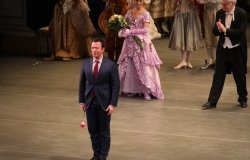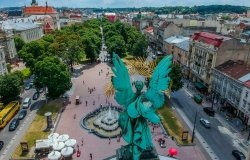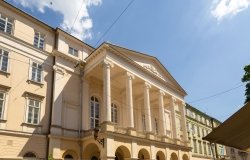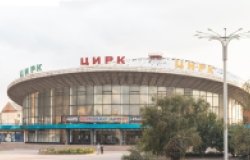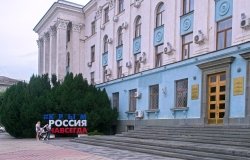Luncheon Policy Forum with Athens Mayor Dimitris Avramopoulos and Istanbul Mayor Ali Mufit Gurtuna
On March 29, Mayor Avramopoulos was hosted for a luncheon with 100 top policy makers and opinion leaders in Washington. The mayor discussed developments in the Southeast Europe region and the role of cities. His Istanbul counterpart, Mayor Ali Mufit Gurtuna, was also a guest at the event.
Overview
Address of the Honorable Dimitris Avramopoulos
Mayor of Athens
Distinguished Ladies and Gentlemen,
It is a great pleasure and honor for me to be attending today's luncheon, organized by the Western Policy Center, and to have the opportunity to exchange views with you.
The Western Policy Center is an institution which, since its establishment in Washington in 1998, has quite rightly gained a reputation both in the United States and abroad for the significance and high quality of its work in the multi-faceted and complex region of South Eastern Europe.
Under the guidance and direction of Angelo Tsakopoulos and John Sitilides, and together with its excellent staff, the Western Policy Center has contributed both to enhancing understanding of the often misunderstood issues of this region and of ensuring that South Eastern Europe is accorded an appropriate position on the Agendas of decision makers. Moreover it is of particular significance that this think-tank is situated in the international capital of diplomacy and that many prominent policy makers consider its views authoritative.
By highlighting the issues related to South Eastern Europe, the Western Policy Center through its work also promotes the priorities of Greece-priorities, which are inextricably tied to this region. I hardly need to reiterate to you, the great extend to which the interests and future well-being of Greece are synonymous with peace and stability in this region of which Greek-Turkish rapprochement is a vital and indispensable ingredient.
The fact that Greece is the only South Eastern European country which is at the same time a member-state of the European Union and at the same time a member-state of the Atlantic Treaty and of the Western European Union, means that it has a unique role and a unique responsibility to promote those policies which will have the capacity to consolidate economic, social and political progress, as well as peace and stability in this region.
Indeed while its partners are looking for the right solutions to the war ridden region, features of which are the struggling economies of fragile nations, it is Greece which might have the answers to resolve the acute problems. The broad objectives of our partners are the achievement of reconstruction and economic recovery and stability of South Eastern Europe. Within this framework Greece is dynamically contributing by virtue of a series of initiatives.
Two months ago I had the pleasure to personally welcome at the City Hall of Athens a delegation from the Western Policy Center of young American policy analysts. This visit gave me the opportunity to brief in considerable detail these future decision-makers on the recent remarkable developments in Greek-Turkish relations, the special role of Greece in the promotion of the South Eastern European region, as well as on the particular role that Cities can play in this process. I would like to now turn to the topic of the international role of Cities and namely of the concept of Diplomacy of Cities of which I am an advocate, and the City of Athens has taken many important initiatives with considerable impact.
The Diplomacy of Cities is a new concept in international relations, the momentum for whose development has been made possible by the new global reality in the post cold war period. Cities today are becoming increasingly active in the field of international diplomacy.
The past decade has witnessed enormous upheavals in our international system, with an ever increasing number of violent and bloody regional local conflicts, no where less than in our area of South-Eastern Europe. We talk of super powers and nations being affected, but the first in the firing line are the inhabitants of cities and towns, both young and old, who have to survive the consequences of bombings, reprisals, ethnic cleansing, arrests, torture, ill-treatment, famine and lack of medical assistance.
Under these circumstances it is surely inconceivable that cities can remain inactive and it is only natural that Cities have an increased political will to assume a role and ensure that the voice of their residents is effectively heard in the various fora of international decision making. Under such circumstances, it is also understandable that fellow residents of cities in neighboring regions, cannot rest idle but have the desire to contribute to alleviating the plight of the troubled and afflicted.
Let me give you concrete examples of this civic process in action, notably the reaction of cities and their citizens in the wake of the recent earthquakes in Turkey and Greece: Two tragedies which thanks to civil action have managed to bring closer together two peoples traditionally divided by age long animosity.
The pictures of devastation and suffering in Turkey broadcast live by the independent media, suddenly made the feeling of mistrust based on deep rooted prejudices which had been part of the political consciousness of the people of both countries, seem irrelevant and insignificant, submerged by the very human reflex to help those in need and those who are suffering. The City of Athens, picking up the mood of its citizens, responded immediately according to their will: Contacts were established with the municipality of Istanbul and a considerable humanitarian aid, known as Operation Solidarity was collected, organized and dispatched to the victims in Turkey.
I personally visited the City of Istanbul in the days following the devastation of the city and its environs, and my colleague Mr. Ali Mufit Gurtuna, the Mayor of Istanbul also came to Athens to pay his respects to the families of the victims of the Athens tragedy. I have since been to Istanbul three times and I am proud to tell you that during my last visit on the 17th February the Protocol of Friendship and Cooperation between Istanbul and Athens was signed. This is an Agreement, which reflects the new climate of good will and affirms the desire of these two cities to pursue their role as pioneers in the creation of friendship between the peoples of their countries.
In retrospect it will be seen that what happened was that two cities - Athens and Istanbul - responded to, what I would call, the conspiracy between history and nature, to contribute to the promotion of the rapprochement between Greece and Turkey. That they were able to lead the way in this process is due to the fact that cities have the capacity to act with greater speed and with a greater flexibility than nation states can. It is also due to the fact that city administrations are in more immediate contact and closer to the people than bureaucrats and decision - makers of central national governments can hope to be.
Let me now tell you about the developing role of cities in South Eastern Europe. On the initiative of Athens, the capitals of this region have become members of the Standing Conference of Mayors of the Capitals of South Eastern Europe. This organization was established in 1995 and its permanent secretariat its based in Athens. Regular meeting have strengthened contacts and ties of friendship regardless and independently of national tensions. This is reflected by the fact that the Mayors of Belgrade and Sarajevo had the courage to sign the Athens Cooperation Protocol, which binds the member capitals, at the peak of the crisis in Bosnia-Herzegovina and despite the pointed instructions not to do so, from their respective governments.
It is not only cities directly afflicted by natural catastrophes or armed conflicts, which are bound together in common cause. Significantly, City - dwellers throughout the world are facing common problems that threaten to disrupt their social fabric: unemployment, social exclusion, crime, drugs, environmental degradation and illegal immigration with its ensuing scourge of xenophobia - these are issues which typify the reality of cities today and the lives of their inhabitants.
This is not a minority of the world's population because a growing portion of the world's inhabitants are urban dwellers. To cite on example, 80% of the European Union's population are living today in cities. The problems faced by this silent majority, which is what I call city dwellers, is generating a worldwide consensus, that their solutions have to be debated and formulated by the level of government closest to them, which in many cases is their immediate locality and city. Decision making, when left to central governments which are often far removed from the everyday lives of city dwellers is too often inadequate and has had the effect of creating a deep sense of alienation.
The Members-States of the European Union were amongst the first countries to recognize the sense of alienation felt by many of their citizens. Identifying a democratic deficit which undermined the legitimacy of their policy making, the decision was taken to introduce into the EU Treaty the principle of subsidiarity, by which all legislative proposals have to be formulated at the level closest to the citizens and all Acts have to be justified on its basis.
Recognizing the increasing affiliation of EU citizens to their cities and region, the EU has established a new institution - The Committee of the Regions, which brings together city and regional leaders, and of which I am a member. Significantly, this institution has to be formally consulted on all proposals for new legislation in the European Union and its views taken into account in their formulation. In this way, the Member States hope to achieve greater legitimacy for their policies.
Other organizations including the Council of Europe have also taken measures to ensure the representation of cities and regions. The Council of Europe has established for this purpose the Congress of Local and Regional Authorities in Strasbourg. Important N.G.Os also abound, such as the International Union of Local Authorities, the Union of Capitals of the E.U. and EUROCITIES.
Cities in all these European and international organizations are increasingly active in diplomacy, and indeed their representatives often serve, in them, in essence as ambassadors for their residents promoting priority issues but most importantly consolidating bonds and ties of friendship across national borders.
Institutions have been mentioned, but so far no reference has been made to the supreme historical global organization of all, the United Nations. Last November in New York, I had the opportunity to discuss the international role of cities with Secretary - General Mr. Kofi Annan. We had a substantial discussion on the importance of cities as the focus for an increasing number of the world's population and the need that this new reality of contemporary society should be reflected in organizations with universal decision making powers.
Moreover, cities must assume the capacity for making the voice of their inhabitants heard and counted, in order to contributed to and shape decisions, which are of their direct concern. We agreed that I should submit a paper on this subject which I duly did and to which significantly I received a Message of support and encouragement. In his message Mr. Annan affirmed his faith in the potential of local diplomacy. In the secretary general's words «Peace can be built from the base, and I strongly support all the parties involved in the Diplomacy of Cities movement». The Message concluded by extending encouragement to all that take part in this initiative of the City of Athens for peace in the world.
My discussion today would not be complete if I do not talk to you about one of the most exciting events in the modern history of the City of Athens, and that is of course the privilege to be the host city to the 2004 Olympic Games. The challenge is that we want to be able to rejoice the return of the Games to its birthplace by hosting the greatest celebration on earth. Fundamental to the realization of this challenge, is the transformation of Athens into a model city for the new millennium.
Work is already in progress and much has already been achieved. The transformation of the City is based around three large - scale infrastructure projects, the first part of which - the extension of the subway system is already completed. The second project is the development of the Athens international airport, which it is envisaged that by the year 2001, will be the most modern in Europe, with a capacity to handle over 16 million travelers a year. Third, also by the year 2001 a total of 71 kilometers of new motorways will be operational. These will link the new airport with central Athens, create a major new ring road with 32 interchanges connecting the new roads with the existing system and subway stations.
Beyond the Games themselves, the preparations for the Olympics have as their goal the life of the City of Athens the day after the closing ceremonies. The challenge we want to successfully rise to is to achieve the best Olympic Games in history, the infrastructure for which will have been developed with respect to both the natural and urban environment with the result that the City will be more beautiful, more humane and more functional.
Next year, Greece is expected to start the new century by joining eleven of her European Union partners in Economic and Monetary Union, a step which will be obtained by meeting the macroeconomics criteria stipulated by the Treaty on European Union. Reflecting rapid growth rates, the Athens Stock Exchange has become the second largest emerging stock exchange preparing the way for the investment of foreign capital.
In the context of such extraordinary developments in the urban fabric of the city, the Municipality has taken the lead by founding the Athens Third Millenium Organization. The objective of this organization is to explore the unique possibilities which the new millenium offers for the dissemination of the historical and cultural heritage of Greece, as well as to contribute to the organization of the Games and ensure that Athens will be established, in the post Olympic 2004 era as a pole attracting investment and generating growth at the cross-roads of three continents.
Ladies and gentlemen, we are living at the beginning of a new millennium. These are exciting times and we have much to celebrate as we embark on the new century. But we need 21st Century ideas to make sure that the opportunities of the 21st Century are exploited to their full potential and that we successfully rise to the challenges presented to us, in these new and changing times. The old assumptions on each end of the political spectrum are often outmoded or irrelevant, leaving many citizens alienated from the centers of decision making.
I believe in the potential of cities to address many of the shortcomings illustrated, and in their capacity to play a constructive role in promoting peace and stability on the international stage. The opportunities offered must not be ignored. I have come here today in my capacity as Mayor of Athens, to convey the spirit of Athenians pioneering to build a city worthy the new century and leading the way as a center for the promotion of international peace. We are optimistic and enthusiastic. Thank you.
Excerpts from remarks by Istanbul Mayor Ali Mufit Gurtana
I would like to thank the Western Policy Center from the bottom of my heart for organizing this forum and for your invitation.
I am hoping that this meeting, and others like this, will bring our area -- the Aegean region, the Eastern Mediterranean, the Balkans, and the Black Sea -- together in peace and harmony.
For the first time in a long time, there are warm relations in our region. Winds of friendship are blowing between the two countries. This friendship came out of a time of sorrow.
We persevered through two major earthquakes in Istanbul and Athens. From our pain, we grew closer together and developed this more serious friendship between Athens and Istanbul. Mayor Avramopoulos and I call this "the friendship that emerged from the sorrow."
This relationship between the cities also improved the relationship between Greece and Turkey, and helped bring them closer together. After the earthquake, while I was visiting Athens, Mayor Avramopoulos and I met with President Stephanopoulos.
He told us, "You have a difficult and lengthy road ahead of you as mayors of Athens and Istanbul. I believe that you will accomplish great things. I hope you will continue to achieve your objectives."
We continued our work and recognized the advantages. We signed social, cultural and economic accords. We offered our signatures in hopes of securing an everlasting friendship.
I believe, and it might seem too ideal, that this friendship between Istanbul and Athens will help enhance the friendship between our countries, as Greece, Turkey, and the surrounding regions become more prominent on the world scene.
We promise to abide by our signatures and continue this friendship. Our ancient and historical ties will help serve as common ground for establishing peace. We enjoy many similarities and we will push these forward, even as we push our differences back.
The Turkish philosopher Mevlana has said, "For all these years you lived your life hard as a rock, what have you accomplished? Be soft like the soil for a while and witness all the possibilities."
I want this friendship and cooperation to last for decades, and I thank you supporting this friendship that emerged from the sorrow.
Hosted By

Global Europe Program
The Global Europe Program is focused on Europe’s capabilities, and how it engages on critical global issues. We investigate European approaches to critical global issues. We examine Europe’s relations with Russia and Eurasia, China and the Indo-Pacific, the Middle East and Africa. Our initiatives include “Ukraine in Europe” – an examination of what it will take to make Ukraine’s European future a reality. But we also examine the role of NATO, the European Union and the OSCE, Europe’s energy security, transatlantic trade disputes, and challenges to democracy. The Global Europe Program’s staff, scholars-in-residence, and Global Fellows participate in seminars, policy study groups, and international conferences to provide analytical recommendations to policy makers and the media. Read more
Thank you for your interest in this event. Please send any feedback or questions to our Events staff.
